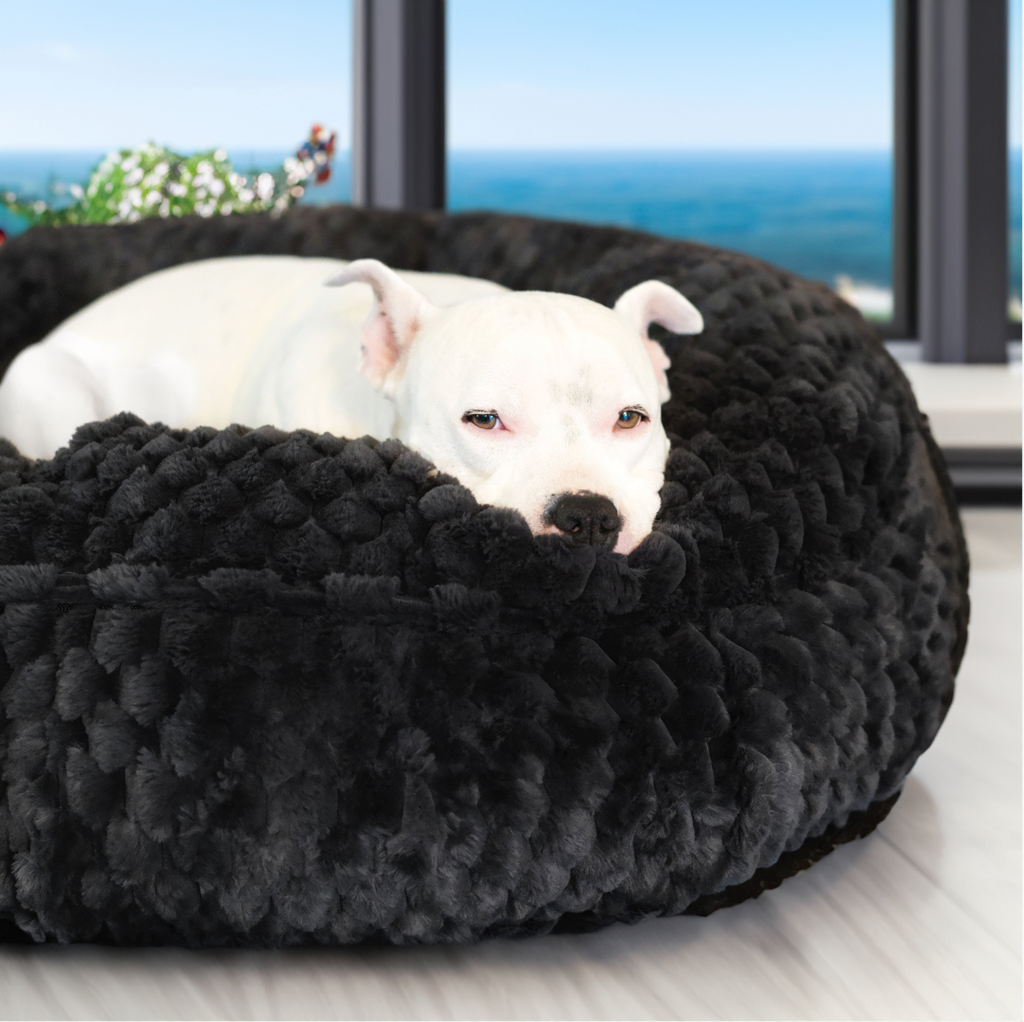Can Dogs Have Autism? Signs and Symptoms of an Autistic Dog

Did you know that approximately 1 in 59 children in the United States are diagnosed with autism spectrum disorder? While we are familiar with autism in humans, have you ever wondered if dogs can experience something similar? As dog parents, we must know that our furry friends may struggle with autism-like symptoms, known as canine dysfunctional behavior or an autistic dog. This blog post will explore autistic dog behavior, its potential causes, and how to manage and support dogs affected by this condition.
Short Summary
-
Canine Dysfunctional Behavior is a condition in dogs similar to Autism Spectrum Disorder.
-
Identifying the signs of autism in dogs involves recognizing issues with social interaction, repetitive and compulsive behaviors, and heightened sensitivity to stimuli.
-
Managing autistic dogs requires providing a safe environment, exercising regularly, employing tailored training techniques, bathing with toxin-free products, and offering comfort and security through high-quality luxury dog beds.
Understanding Canine Dysfunctional Behavior
Canine dysfunctional behavior is a condition in dogs similar to autism spectrum disorder in humans, characterized by social, communication, and behavioral challenges. Like autistic children, dogs with canine dysfunctional behavior may have issues with their mirror neurons, which play a crucial role in forming bonds and understanding social behaviors.
While the exact cause of canine dysfunctional behavior is yet to be definitively established, it is presumed that a lack of mirror neurons and genetic factors may contribute to this condition.
What is Canine Dysfunctional Behavior?
Canine dysfunctional behavior impacts their social interactions, communication, and dog behavior, akin to autism in humans. Dogs with this condition may exhibit autism-like symptoms such as reduced interaction with other dogs and people, repetitive motions, and heightened sensitivity to stimuli.
Understanding this condition is vital for dog owners to be able to provide proper care and support for their pets.
Causes of Canine Dysfunctional Behavior
The exact causes of canine dysfunctional behavior remain uncertain, but it is believed that congenital factors, such as a lack of mirror neurons and genetic predispositions, may play a role. Mirror neurons enable pups to imitate or “mirror” the social behavior of other dogs.
Additionally, recent studies have indicated that canines exposed to harmful chemicals may be more likely to sire pups with canine dysfunctional behavior, suggesting that environmental factors could also contribute to the development of this condition.
Identifying Signs of Autism in Dogs
Recognizing the signs of autism in dogs is crucial for providing appropriate care and support. It is important to note that diagnosing autism in dogs can be challenging due to the species difference and the fact that some signs of autism may also be present in other conditions, such as anxiety disorders or hyperkinesis.
To better understand the signs of autism in dogs, let us explore the three main categories: social interaction issues, repetitive and compulsive behaviors, and sensitivity to stimuli.
Social Interaction Issues
Dogs with autism, sometimes referred to as canine autism or dog autism, may demonstrate difficulty with social interactions, avoiding eye contact, and opting for solitary activities instead of playing with other dogs or humans. They may not express their emotions like other dogs or manifest trance-like behaviors.
Understanding these social interaction issues is essential for dog owners to create a comfortable and supportive environment for autistic dogs.
Repetitive and Compulsive Behaviors
While most dogs may not exhibit such behaviors, autistic dogs often display repetitive and compulsive behaviors such as tail chasing behavior, teeth grinding, and obsessive chewing. These behaviors can result in physical and mental fatigue and potential harm to the dog.
Dog owners, especially those with bull terriers, must be aware of these behaviors and seek professional help to effectively manage and support their dogs.
Sensitivity to Stimuli
Autistic dogs, including young dogs, may be hypersensitive to stimuli, potentially exhibiting an inappropriate reaction to sudden sounds or avoiding new environments. They may react as if injured or even display aggression when overstimulated.
Recognizing this sensitivity to stimuli can help dog owners create a low-stress environment for their autistic dogs, thus improving their overall quality of life.
Animals Matter Luxury Dog Blankets and CA Prop 65 tested Fabrics for Low VOCs
Animals Matter Luxury Dog Blankets and Waterproof Dog Blankets Fabrics are CA Prop 65-tested for Low VOCs.
Diagnosing Canine Dysfunctional Behavior
To diagnose canine dysfunctional behavior, it is necessary first to rule out any other potential conditions and then assess the dog’s behavior by a veterinarian. Diagnosing autism in dogs involves a combination of differential diagnosis and veterinary assessment.
This includes observing the dog’s behavior, considering the environment in which the dog lives, and conducting tests to rule out any potential problems.
Differential Diagnosis
Differential diagnosis is a process of eliminating other conditions with similar symptoms, such as anxiety or neurological disorders. It is essential to accurately determine whether a dog is experiencing canine dysfunctional behavior or if another condition causes their symptoms.
Consulting a veterinarian is crucial in performing a differential diagnosis and ensuring proper care and support for the dog.
Veterinary Assessment
A veterinary assessment for canine dysfunctional behavior involves a physical examination, taking a behavioral history, and utilizing questionnaires and rating scales to evaluate cognitive dysfunction in dogs. By comparing the dog’s behavior to normal canine behavior, a veterinarian can help identify dysfunctional behavior and provide appropriate guidance for managing and supporting the affected dog.
This assessment can help to identify underlying medical conditions that may be causing the behavior and underlying medical conditions that may be causing the behavior.
Managing and Supporting Autistic Dogs
Caring for an autistic dog involves creating a safe and supportive environment, ensuring regular exercise and a well-balanced diet, and employing appropriate training techniques. By understanding the unique needs of dogs with this autistic behavior, dog owners can ensure their pets live a comfortable and fulfilling life.
Keeping your dog free of toxins by bathing regularly
Regular bathing with toxin-free products can help keep autistic dogs comfortable and healthy. By using pet-safe cleaning products or creating a DIY cleaner made up of components such as vinegar, baking soda, and lemon juice, dog owners can minimize their dog’s exposure to potentially harmful chemicals and create a safe environment for their pets.
Bathing with plant-based organic and natural products can help reduce the risk of skin irritation and other health issues.
Animals Matter Organic Dog Shampoo
Animals Matter Certified Organic Dog Shampoo is a mild and secure choice for bathing dogs with autism. This shampoo comprises plant-based, certified organic, and all-natural ingredients for sensitive noses and skin. It is free of caustic chemicals and toxins, making it appropriate for bathing autistic dogs.
Utilizing a gentle shampoo like Animals Matter Organic Dog Shampoo can help maintain the health and comfort of your autistic dog.
Creating a Safe Space
Creating a safe space for autistic dogs, such as a dog bed or covered crate, can help them feel secure and reduce anxiety. Providing a tranquil area in the house for the dog to retreat to, avoiding crowded places, and displaying a note on the door to remind visitors to knock lightly can all contribute to a low-stress environment for autistic dogs.
Creating a safe space for autistic dogs can help them feel secure and reduce anxiety. This can be done.
Animals Matter Luxury Dog Beds for Autistic Dogs
Animals Matter Luxury Dog Beds provide a comfortable and supportive environment for autistic dogs to rest and relax. These orthopedic, anti-anxiety, and calming dog beds are crafted with CertiPUR-US Certified, Companion-Pedic memory foam, tested for low VOCs. This low-toxin medical-grade orthopedic foam offers the requisite support and comfort for autistic dogs, thereby diminishing stress and joint pain.
By providing an appropriate sleeping area, dog owners can improve the overall well-being of their autistic pets.
Exercise and Diet
Regular exercise and a well-balanced diet can help reduce anxiety and control repetitive behaviors in autistic dogs. Ensuring that nutritional needs are met can prevent additional health issues from contributing to the dog’s difficulties, while regular physical activity can help manage anxiety and repetitive behaviors.
Dog owners must consult a veterinarian to determine the best exercise and diet plan for their autistic dogs.
Training Techniques
Consulting an experienced dog trainer for guidance on training and interacting with dogs with autism is essential for their proper care and support. An experienced trainer can help identify the most effective approach to training and interacting with an autistic dog. This approach ensures their unique needs are met while building a solid bond between the dog and their owner.
You will be guided by an experienced trainer throughout your training and interactions with them.
Summary
In conclusion, understanding canine dysfunctional behavior and its potential causes can help dog owners recognize signs of autism in their pets, thus providing appropriate care and support. By creating a safe and comfortable environment, ensuring regular exercise and a well-balanced diet, and consulting experienced dog trainers, dog owners can ensure the well-being and happiness of their autistic dogs.
By being proactive and attentive to the unique needs of dogs with canine dysfunctional behavior, dog owners can make a significant difference in the lives of their autistic pets. With proper care, support, and understanding, these special dogs can live fulfilling and comfortable lives alongside their loving owners.
Frequently Asked Questions
What are the signs of autism in dogs?
Signs of autism in dogs include repetitive motions such as circling a room, chronic tail-chasing, or obsessive teeth grinding, and sensitivity to sounds, and smells, causing overactive reactions to stimuli.
Autistic dogs, including young dogs, may be hypersensitive to stimuli, potentially exhibiting an inappropriate reaction to sudden sounds or avoiding new environments. They may react as if injured or even display aggression when overstimulated.
Recognizing this sensitivity to stimuli can help dog owners create a low-stress environment for their autistic dogs, thus improving their overall quality of life.
Additionally, obsessive chewing may also be a sign of autism.
Can dogs be autistic?
Yes, dogs can be autistic - a condition called canine dysfunctional behavior (CDB). This is an idiopathic condition, meaning its cause is unknown.
Does my dog have canine autism?
While there is no definitive way to diagnose canine autism, certain behaviors such as repetitive activities, distress at broken routines, social withdrawal, and unresponsiveness could point towards an autism-like condition known as canine dysfunctional behavior.
This condition is not yet fully understood, but it is believed to be caused by genetic and environmental factors. It is important to note that not all dogs with these behaviors have canine dysfunctional behavior and that other medical conditions can cause some of these behaviors.
What is a dog's dysfunctional behavior disorder?
Dogs with dysfunctional behavior disorders exhibit antisocial behaviors, such as a lack of attention to their owners and avoiding interaction with other dogs.
These are similar to autism-like behaviors in humans.
Are there any specific products that can help my autistic dog?
Animals Matter Luxury Dog Blankets, CA Prop 65 tested fabrics, CertiPUR-US Certified, Companion-Pedic Memory Foam, All Natural, Plant-Based Certified Organic Dog Shampoo, and Calming Luxury Dog Beds such as the New Katie Puff Encore Puff and the Katie Puff Encore Lounger can help your autistic dog feel more comfortable and supported.
These products are designed to provide high-quality comfort and support to your pet while also being safe and non-toxic. They are made with materials tested for safety and are free of harsh chemicals. The fabrics are soft and comfortable, and the beds are designed to provide perfect comfort.
1 comment
Subscribe
Sign up to get the latest on sales, new releases and more…
Categories
- My Dog Is Limping: How to Tell When Rest Is Enough, and When to Call/Visit the Vet
- How to Get a Fearful Dog to Trust You: A Compassionate Guide for Rescue Dogs
- What Is Dog Boarding? A Complete Guide to High-End Stays for Your Dog
- Dog UTI Symptoms: How to Spot, Treat, and Prevent Urinary Tract Infections
- Psyllium Husk for Dogs: Science-Based Benefits, Dosage and Use
- Dog Meal Prepping : A Complete Guide to Healthy, Time-Saving Homemade Meals
- Best Places to Take Your Dog on Vacation this 2026(USA Edition)
- Tails of Celebration: Working Dogs of the Lares Trek, A Silent Partnership In Peru
- 5 Easy Organic Christmas Recipes for Dogs: Simple Holiday Treats Your Companion Will Love
- The 6 Best Luxury Gifts for Your Dog This Christmas: Thoughtful Holiday Comfort That Truly Lasts
- Why Playtime Matters: The Benefits of Mental Stimulation and Playtime with Your Companion
- Tails of Celebration: The Miao Dog-Carrying Festival - A Hero's Honor in China
- A Dog-Friendly Thanksgiving 2025: Comfort, Calm, and Easy Treat Recipes
- The Best Dog Beds for Winter 2025: 5 Luxury Styles for Warmth, Comfort & Orthopedic Support
- Tails of Celebration: The Feast of Saint Hubert — Belgium's Timeless Blessing
- Halloween Safety Tips for Dogs: How to Keep Your Companion Safe This Spooky season
- Tails of Celebration: Día de los Muertos / Day of the Dead for Pets, A Festival of Memory in Mexico
- How to Care for Senior Dogs in Fall: Mobility Tips & Joint Support
- Tails of Celebration: Kukur Tihar & The Tihar Festival of Nepal
- What is a VDI Testing for dogs ? : Insights, Procedures and Preventive Measures
- Cheap Dog Beds vs. Luxury Dog Beds: The Real Cost of a $50 "Disposable" Dog Bed
- Can Dogs Have OCD? Understanding Canine Compulsive Behaviors (CCD)
- Does My Dog Like Music? Find Out What Tunes Make Your Pup Wag!
- Effective Solutions for Food Aggression in Dogs
- 7 Frozen Treats Your Dog Will Love This Summer☀️🧊🍉
- The Best Waterproof Liners for Dog Beds: Protect Against Spills, Drool, and Accidents
- How to Cope with the Loss of a Dog: A Tribute to Every Companion We Carry in Our Hearts
- Top Tips on How to Prevent Matting in Dogs
- Understanding and Managing Dogs with Hip Dysplasia
- The Ultimate Guide to Dog Gut Health: Natural Remedies, Probiotic Insights and Signs of Poor Gut Health
- The Best Supplements for Dogs: Explore Top Picks for Canine Health and Wellness
- How Often Should I Brush My Dog's Teeth? Tips for Optimal Canine Dental Health
- Ultimate Guide on How to Comfort Your Dog During Fireworks this 4th of July
- Managing a Blowing Coat: Essential Grooming Tips for Double-Coated Dogs.
- 5 Daily Habits That Boost Your Dog’s Long-Term Wellness
- Mastering Crate Training a Dog: Tips and Benefits
- Dog Car Seats vs. Seat Covers: What’s The Best Option For Your Companion?
- Best Outdoor Dog Beds: Luxury, Durability, and Unmatched Comfort
- Is My Dog Overweight? Tips to Assess and Help Your Companion
- The Best Faux Fur Dog Beds for Ultimate Pet Comfort of 2025
- Dog Running Guide: How to Start, Train & Stay Safe when running with your Dog
- Indestructible Dog Beds? The Truth Behind the Term
- Top Tips for Effective Exercise for Dogs
- Effective Dog Ear Cleaning: A Step-by-Step Guide for Maintaining Healthy Ears
- How to Manage Dog Aggressive Behaviors: Expert Tips and Advice
- Effective Canine Ear Infection Remedies: Symptoms, Causes & Treatments
- How to Make a New Dog Comfortable in Their New Home - 2025 Guide
- Signs of Dog Allergy Symptoms and How to Help and Prevent Them
- Why Does My Dog Lick Their Paws? Causes and Solutions Explained
- Dog Alzheimer's: Symptoms, Causes, and Treatment Options












Thank you so much for this article! My dog has Canine Autism and was thankfully diagnosed early on thanks to my background in autism. I saw similar traits at 11wks old and dove into research finding that dogs could have it. Articles like this help pet parents like me learn and get help. My boy is now 3 and thriving! One thing that isn’t mentioned in your article is compression! I use clothing on my dog which helps him and when he’s having a meltdown I use dog pajamas which are tighter to add to the compression. One big issue we have is grooming. The razor is both a sound and a sensation (touch) so its a huge trigger for him and requires medication before hand. I don’t take him to a groomer, I learned how to do it myself so I can use all my understanding of his needs and all the therapies we’ve learned to help get him through it. I wish there were more conversations about Caninie Autism to help pet parents like me talk to each other and help each other learn how to help our extra special dogs.
Leave a comment
Please note, comments must be approved before they are published